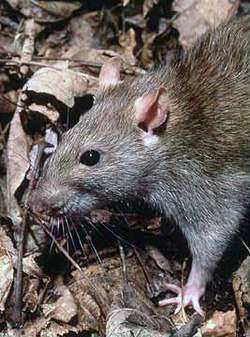rat
English

Pronunciation
- enPR: răt, IPA(key): /ɹæt/
Audio (US) (file) Audio (UK) (file) - Rhymes: -æt
Etymology 1
From Middle English ratte, rat, rotte, from Old English ræt, as though from Proto-Germanic *rattaz, *rattō (compare West Frisian rôt, Dutch rat); but the rat was unknown in Northern Europe in antiquity, so if the Proto-Germanic word is real it must have referred to a different animal. Attestation of this family of words begins in the 12th century.
Some of the Germanic cognates show consonant variation, e.g. Middle High German rate, radde, ratte, ratze. The irregularity may be symptomatic of a late dispersal of the word, in which case it would not be old. Kroonen (2011) rather accounts for it with a Proto-Germanic stem *raþō nom., *ruttaz gen., showing both ablaut and a Kluge's law alternation, with the variation arising from varying remodellings in the daughters. This requires a Proto-Indo-European etymon in final *t, and is hence incompatible with the usual derivation from Proto-Indo-European *reh₁d- (“to scrape”).
Noun
rat (plural rats)
- (zoology) A medium-sized rodent belonging to the genus Rattus.
- 2013 May-June, Charles T. Ambrose, “Alzheimer’s Disease”, in American Scientist, volume 101, number 3, page 200:
- Similar studies of rats have employed four different intracranial resorbable, slow sustained release systems—surgical foam, a thermal gel depot, a microcapsule or biodegradable polymer beads.
-
- (informal) A term indiscriminately applied to numerous members of several rodent families (e.g. voles and mice) having bodies longer than about 12 cm, or 5 inches.
- (informal) A person who is known for betrayal; a scoundrel; a quisling.
- 1883, Robert Louis Stevenson, Treasure Island
- He’s more a man than any pair of rats of you in this here house.
- What a rat, leaving us stranded here!
- 1883, Robert Louis Stevenson, Treasure Island
- (informal) An informant or snitch.
- (informal) A scab: a worker who acts against trade union policies.
- (slang) A person who routinely spends time at a particular location.
- Our teenager has become a mall rat.
- He loved hockey and was a devoted rink rat.
- (Britain, north-west London, slang, vulgar) Vagina.
- Get your rat out.
- A wad of shed hair used as part of a hairstyle.
Synonyms
- (person known for betrayal): traitor (see for more synonyms)
- (informer): stool pigeon
Derived terms
Translations
|
|
|
Verb
rat (third-person singular simple present rats, present participle ratting, simple past and past participle ratted)
Synonyms
- (to betray someone to an authority): tell on, to finger or put the finger on, bewray
Translations
- The translations below need to be checked and inserted above into the appropriate translation tables, removing any numbers. Numbers do not necessarily match those in definitions. See instructions at Wiktionary:Entry layout#Translations.
|
Etymology 2
From Middle English ratten, further etymology unknown. Compare Middle High German ratzen (“to scratch; rasp; tear”). Could be related to write. See also rit.
Noun
rat (plural rats)
Verb
rat (third-person singular simple present rats, present participle ratting, simple past and past participle ratted)
Catalan
Danish
Etymology
Dutch
Etymology
From Middle Dutch ratte.
Pronunciation
- Rhymes: -ɑt
- IPA(key): /rɑt/
Audio (file) - Homophone: rad
French
Etymology
From Middle French rat (“rat”), from Old French rat (“rat”), from Frankish *rato (“rat”); further origin uncertain. More at rat.
Pronunciation
- IPA(key): /ʁa/
audio (file)
Related terms
Further reading
- “rat” in le Trésor de la langue française informatisé (The Digitized Treasury of the French Language).
Middle Dutch
Etymology 1
From Old Dutch *rath, from Proto-Germanic *raþą, from Proto-Indo-European *Hret-.
Inflection
This noun needs an inflection-table template.
Etymology 2
From Old Dutch *rath, from Proto-Germanic *raþaz, from Proto-Indo-European *Hret-.
Inflection
This adjective needs an inflection-table template.
Descendants
- Dutch: rad
Middle English
Norman
Etymology
From Old French rat (“rat”).
Occitan
Synonyms
Derived terms
Related terms
Old French
Romani
Romansch
Etymology
From Frankish *rato (“rat”).
Serbo-Croatian
Etymology
From Proto-Slavic *ortь, from the o-grade of Proto-Indo-European *h₃er- (“to rise, to attack”), cognate to Ancient Greek ἔρις (éris, “quarrel, strife”), Sanskrit ऋति (ṛti, “assault”) and Proto-Germanic *ernustuz (“struggle, fight”)
Pronunciation
- IPA(key): /rât/
Noun
rȁt m (Cyrillic spelling ра̏т)
- war
- Sȁmo idìoti mȉslē da rȁt r(j)ešáva pròblēme.
- Only idiots think that war solves problems.
- Rat i mir - War and Peace (Novel by Tolstoy)
Declension
Torres Strait Creole
Volapük
Pronunciation
- IPA(key): [ɾat]
Declension
Hyponyms
- hirat
- jirat
- ratil
- ratül
Derived terms
- ratagöb
- ratajiedot
- ratanäst
- ratifanan
- ratiträp
- rativenen
- taratpuin